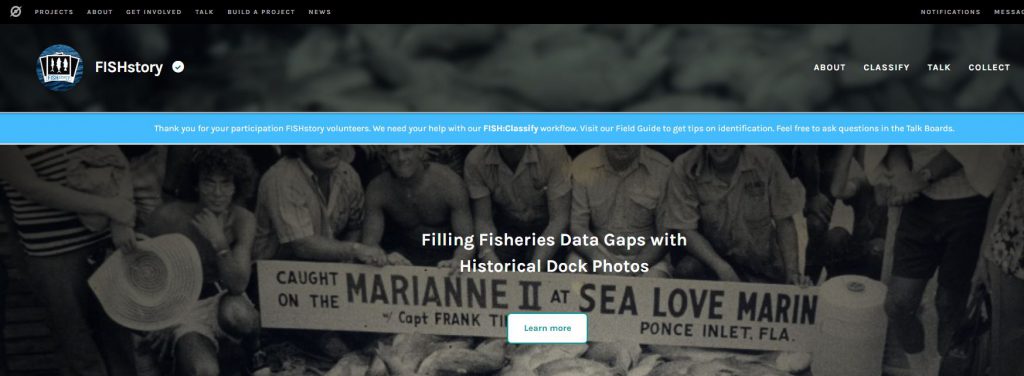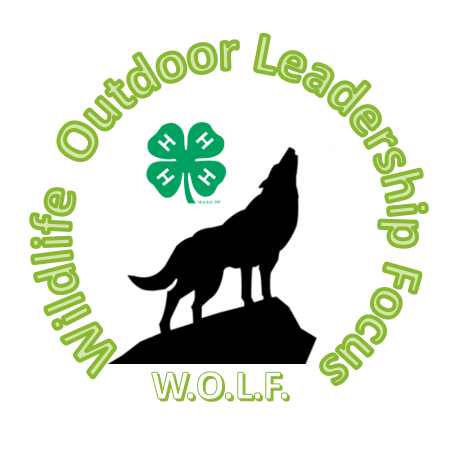
by Ronnie Cowan | Aug 14, 2020
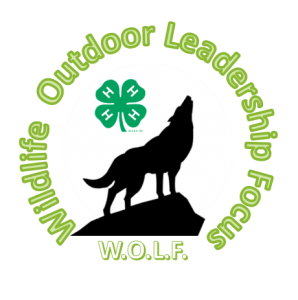
Environmental education can be a very broad topic. The study of how living organisms interact within their environment can be very complicated, especially when we factor in the human element. An Okaloosa County 4-H program Called Wildlife Outdoor Leadership Focus or (W.O.L.F.) was created to address the human dimension of natural resources. Basically, this is a youth conservation program dedicated to making participants aware of the importance of natural resources recreation and to apply the art and science of natural resource management. W.O.L.F. has three main objectives.
Objective 1 – Learn the Importance of Natural Resources
The W.O.L.F. program starts by explaining why these natural resources are important. For example, outdoor activities such as hunting, fishing, boating and wildlife viewing contribute over $25 BILLION to the state of Florida. People are very passionate about their outdoor activities. Florida hunters average nearly $3,000 per person on hunting expenditures per year! Our state has a vast stakeholder interest. Nearly 6 million people participate in wildlife/fisheries activities every year in Florida. The L in W.O.L.F. stands for leadership. Local, state, and federal leaders make important decisions every year regarding natural resource management. Teddy Roosevelt, our 26th President of the United States, established 230 million acres of public land for all to enjoy. Government still protects many of our natural resources today. Florida is home to 175 state parks.
Objective 2 – Apply Theory and Practice Conservation
W.O.L.F. participants receive hands on practice of being a conservationist. The program teaches 4-H members the science and art behind wildlife management. Florida 4-H has a virtual Wildlife Outdoor Leadership Focus (W.O.L.F.) Day Camp were youth can learn at their own pace. The camp has 5 sections: Woods and Fields, Freshwater, Saltwater, Survival, and Biologist life. Each day has videos and activities that offer a daily challenge. W.O.L.F. campers learn about wildlife/plant identification, and what specific wildlife species need to survive. Furthermore, we show youth how our actions, intentional or unintentional, affect the environment we live in. The virtual day camp also covers basic biology of mammals, birds, fish, and reptile. Participants are encouraged to go out with adult supervision and see what’s going on in the great outdoors.
The final activity is the wildlife challenge where campers must be a wildlife biologist for a day. 4-H members are given a scenario with three wildlife species that the landowner wants to manage on a piece of property. The camper must evaluate the property based on the requirements that the 3 wildlife species need in order to survive. The camper completes a wildlife management plan. They look at the best management practices given to them during the course and decide if the property is a habitat for the desired wildlife species. If it is not, they must offer a solution. For example, the landowner wishes to have more northern bobwhite quail on the property but the land is covered in mature hardwoods. The campers are expected to make a recommendation. They learned that quail need shrubs, native grasses, and forbs.
Objective 3 – Career Development and Multi-Science Approach
The W.O.L.F. program also sparks awareness about the professionals who work with our natural resources. Participants virtually meet biologists, wildlife officers, and other natural resource professionals. Each career video will explain how they help our environment. Campers will get to see what it would be like if they had their jobs.
Let 4-H introduce you or your youth to the Wildlife Outdoor Leadership Focus (W.O.L.F.) program. The program does not just stop with wildlife and fisheries science careers. The program explains many more sciences. 4-H members will learn about soil science, forestry, engineering, math, agriculture, and technology to name a few. The only thing your youth will need is a love for the outdoors. If you are interested in W.O.L.F. Camp, please reach out to your local UF/ IFAS County Extension 4-H Agent. The W.O.L.F. program will also be available as a virtual project in Okaloosa County.
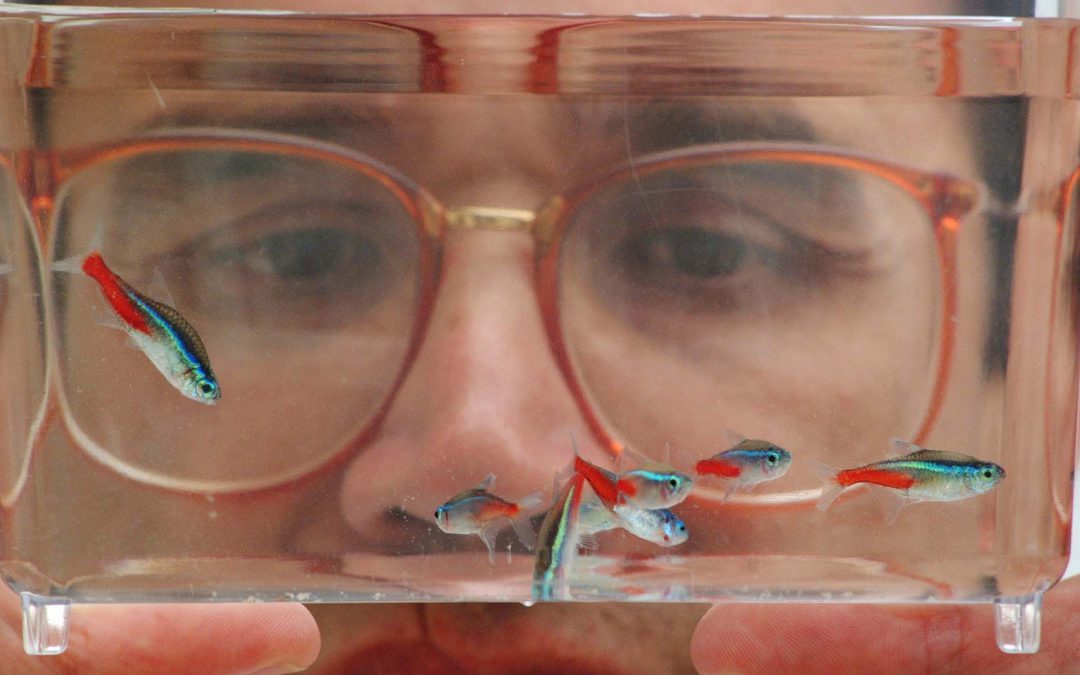
by pmdavis | Aug 7, 2020
4-H members and volunteers are always seeking new ideas for hands-on learning experiences as service activities to positively impact our communities. With covid-19, some community service opportunities have been limited due to social distancing and other restrictions. However, the South Atlantic Fishery Management Council and Florida Sea Grant have a new opportunity for 4-H members to get involved virtually. This opportunity is a citizen science project that would be a great way to build your community service hours and learn something new about fish in the process!
Are any of you into history, helping with research, and like fish? If you answered “yes” to any of these, please consider working with the FISHstory Project! The South Atlantic Fishery Management Council and Florida Sea Grant needs help with a citizen science project to help fill gaps in fisheries data using historical dock photos.
Who can participate? Families and youth ages 16+, or younger youth with an adult mentor who is working with them for the sessions. If you are under the age of 16, you will need your parent to register with you. It is a very simple registration process. First, register for FISHstory at https://scistarter.org/fishstory. Then, click on the https://safmc.net/safmc-fishstory/ link to begin helping count and identify fish in the historical photos.
This project will train you as a citizen scientist to identify and count fish using historic fishing photos from the 1940-1970s, prior to when dedicated catch monitoring began. This is a two-part project. The first part is to simply count the number of fish in the photo. The second part is to identify the fish in the photo. Everything is done online using Zooniverse, so there would be no travel or cost to participate in this project.
Data collected with your help will provide a picture of the fishery in the earlier years. This will help scientists understand the fishing industry prior to dedicated monitoring programs. It will also help improve our understanding of the fishing of several iconic species over the years. This data will be used to help accurately estimate stock productivity from 1940 to 1970 when for-hire fisheries off the Atlantic coast of Florida were gaining popularity. Your help is needed to fill these data gaps to help evaluate assumptions about stock productivity. The historic photos, untapped sources of this important biological data, can help do just that. Analyzing the photos will help provide better information of what people were catching during this time period, seasonality of their catches, and possibly estimate a rough catch per angler, which can provide insights on the health of fish populations during that period.
4-H helps youth to learn the skills needed to lead the positive change in their communities like this one. This is done through hands-on learning opportunities that explore citizenship, community development, and personal growth. For more information on community service projects or other 4-H programs that build essential life skills in youth, please contact your local UF IFAS County Extension Office, or visit http://florida4h.org.
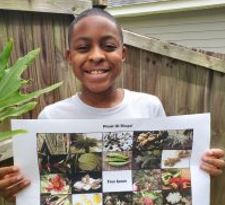
by Marcus Boston Jr. | Jul 31, 2020
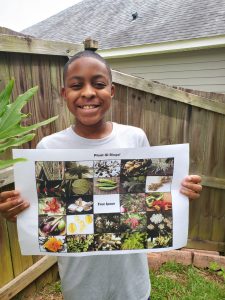
4-H Virtual Plant Science Camp Bingo Game
July 6th of this year was supposed to be the first day of our 4-H Wildlife and Outdoor Recreation Day Camp with Leon and Jefferson Counties participating. Due to the pandemic, all of our Florida 4-H face to face camps were cancelled this summer due to safety concerns for the students and the instructors.
In spite of everything that has taken place since March of this year, there is still some good news! Even though we are in the middle of a pandemic, there is an outdoor classroom in YOUR backyard that has plenty of room for young people and parents to explore. While most youth have spent more time than they probably want to with their families confined, within the four walls of their home, there is no time like the present to explore wildlife and gardening opportunities that await just outside the door. Youth that spend time outside exploring the great outdoors have the unique opportunity to stimulate their senses while engaging in “hands on” educational activities without even knowing it.
4-H provides countless opportunities for youth to gain a better understanding of how all organisms are interrelated and how they can become environmental stewards at home, school, and in the communities in which they live. What are some of the benefits of converting backyards to outdoor classrooms?
I’m glad you asked…here are just a few!
1. Healthy lifestyles are encouraged –
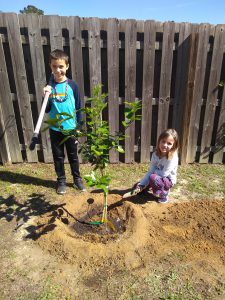
Youth planting an orange tree after participating in Virtual Plant Science Camp
Active time spent outside may help address some of the health issues we are seeing in children today such as obesity, attention deficit disorders, and depression.
2. Nature deficit disorder decline –
Exposing students to nature and allowing them to learn and play outside has shown to foster sensitivity, appreciation, and respect for the environment. It combats “nature deficit disorder” …and it can be a lot of FUN!
3. Critical-thinking skills enhanced –
Exploring what is in the backyard and starting a garden provides opportunities for experiential learning outside of the classroom and enables students to make connections that can be applied to the real world.
4. Responsible action is taken to better the environment –
By exploring outdoors either by planting or just observing nature, youth begin to understand how their decisions and actions affect the environment. It is from this point they can begin to obtain the skills necessary to address complex environmental issues as well as ways we can take action to keep our environment healthy and sustainable for the future.
So even though we are in the midst of a pandemic, there may be opportunities to make lemonade out of the COVID-19 lemons we find ourselves in by unmasking the opportunities that await in our backyards!
For more information about 4-H in your county, find your local UF/IFAS Extension office or visit http://florida4h.org.
*“Please note some pictures were taken prior to our challenges with Covid-19 and we remind people to social distance and wear a mask for the personal safety of self and others.”
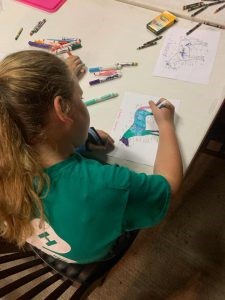
by Rachel Pienta | Jul 17, 2020
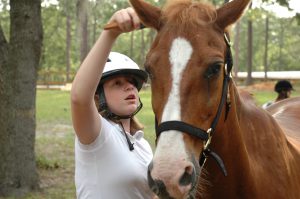
Youth grooming a horse. UF/IFAS Photo: Sally Lanigan.
Across Florida, 4-H clubs have adopted creative ways to stay connected while social distancing
practices are in place. The Wakulla 4-H Bits and Bridles Horse Club, like other 4-H clubs across Florida, ceased in-person activities in mid-March. During the regular program year, the Wakulla 4-H Bits and Bridles Club met monthly for a club meeting that included activities focused on equine science, leadership development, and hands-on skill building. While horseback riding was not a part of every club meeting, most club meetings included some sort of hands-on activity with horses. Club leaders who already had an active Facebook group for their club families, considered how to stay engaged in the face of a prolonged pause in hands-on, face-to-face meetings.
Staying Connected
In Wakulla, the 4-H Bits and Bridles Horse Club has established a welcoming, inclusive environment for both youth with and without horses of their own. After the pause on in-person programming went into effect, Bits and Bridles volunteer leader, Julie Dennis, communicated with youth members and their families via email, sending the following message: “Given the current need to promote safety in our community, we’ll be taking a pause from in-person Bits and Bridles Meetings. Don’t worry though, as soon we can, we’ll get back to our monthly meetings. In the meantime, let’s use our Facebook group as a way to stay connected!”
Julie’s communication was followed by a series of video and photo sharing by adult volunteers and youth members in the private Facebook group for the club, including a challenge to demonstrate a horse-related skill with or without a horse at home. Youth were asked to post, with parent permission or assistance, at least one thing to the Facebook group that they were doing while at home to learn more about horses. The instructions urged youth to post a picture or video engaged in an activity to learn more about horses.
Group members responded by sharing videos demonstrating how to practice several skills with items they had at home: roping livestock and how to use different types of tack. Other youth shared videos demonstrating how to properly care for horse hooves and how to groom a horse. Several youth demonstrated riding activities.
Four Ideas to Stay Engaged with 4-H at Home
Activity ideas were provided to parents to share with youth members. The ideas below were collected by club leader, Julie Dennis, and reviewed by 4-H Agent, Rachel Pienta. Each activity is shared below using language close to or similar to what was shared with 4-H families via email.
Learn a new drill or pattern.
If you have a horse, work on riding in a circle and just the same steps every time at a walk, trot and then collected lope. Dirt lots make a great place to do this because you can retrace your steps and see where your horse has been. Once you master this exercise, work on a serpentine or start by making a small circle and then gradually get bigger. For ideas, get your parents to help you use Pinterest and type in “Horse Drills.” The possibilities are endless. Get someone to take a video and share with us on Facebook!
If you don’t have a horse, you can participate too! Now is the time to get that barrel pattern down. This website has a great summary of the barrel pattern. You can also try your hand at the pole bending pattern. Find some objects at your house (rocks, chairs, whatever you can find outside) and set up these patterns. Then run them yourself & ask a parent to take video for you!
Learn how to clean your tack while practicing the parts of a saddle.
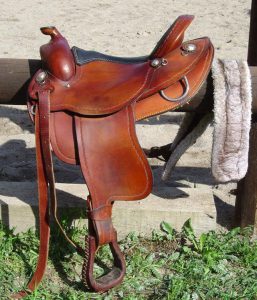
Dry leather can get cracked and brittle.
Spring cleaning! Break out your tack with some good saddle soap and get to cleaning. Remember, this is an important part of being safe when you ride. Dry leather can get cracked and brittle. Anyone who has been around horse shows long enough has seen what happens when an off billet strap breaks. You wind up in the dirt! Not only is this a safety hazard but it can cost you an otherwise very nice run. These are two very good reasons to make sure your tack stays clean.
If you don’t have a horse – there are still ways to learn! There are videos that you can learn from online. Ask a parent to help you search for videos on YouTube.
Start your 4-H Horse Project Record Book!
Now is the time to start on horse projects. A very popular and great project for all kids whether or not you own a horse, is to complete the 4-H Horse Project Record Book. This can be downloaded online. If you don’t have a horse, you can still participate. Make up your horse’s name and then research the information you’ll need to complete each section.
In the case of our club youth, members were encouraged to use online resources to research prices for supplies. Youth without a horse were offered a match with a 4-H Bits & Bridles mentor.
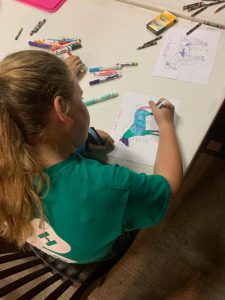
Youth coloring a horse diagram activity sheet.
Build Horse Curriculum into Homeschooling.
The National 4-H program has great curriculum available for all age ranges online. Try building in one horse lesson a week and then keeping a journal about what you’ve learned. This activity can be a great way to keep learning through the summer too!
For more information about 4-H clubs and activities in your community, or to volunteer with 4-H, please contact your local UF/ IFAS County Extension Office.
*“Please note the picture was taken prior to our challenges with Covid-19 and we encourage people to social distance and wear a mask for the personal safety of self and others.”
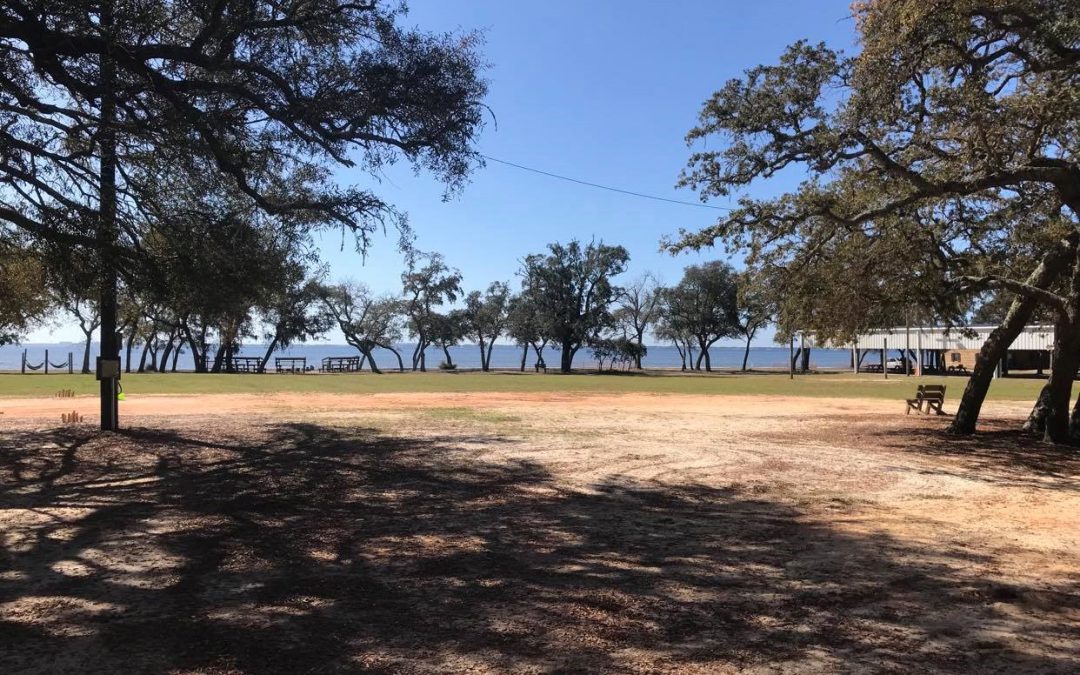
by Ronnie Cowan | Jul 10, 2020
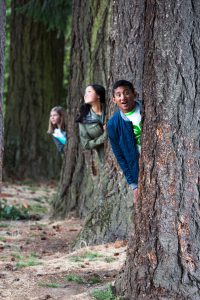
4-H members have fun at the Forestry Judging Contest.
According to the Florida Department of Agriculture and Consumer Services, our state has the largest variety of native trees in the continental United States. The panhandle is home to many of the trees that range across the eastern United States. These species find that the northern part of Florida is their southern limit. Conversely, the sub-tropical plants found in south Florida have reached their northern limits. Each year, 4-H members all across the state have an opportunity to learn about Florida’s great renewable resource.
The Florida 4-H Forestry Ecology Contest allows participants to learn and have a little fun in friendly competition. Teams of 4-H members learn about forest health, tree identification, map symbols, and other elements of forestry management. In other terms, this is forestry judging. Joining a forestry judging team can be very fun and rewarding. These programs help build up relationships with mentors and other children. Furthermore, they offer life skills to children which can be used for a life time of enjoyment in the great outdoors. Since Florida has more than 17 million acres of forests, the benefits of learning how to use a compass, map reading, and tree identification have far greater implications than a forestry competition. One being that this skill can bring youth closer to the environment or at the very least, make them more aware of their surroundings.
Did you know that thousands of items are made from forest products? You will find them all over your house. Your kitchen probably has food additives, spices, dish washing liquid, fruits and nuts made in part by forest products. My favorite drink is ROOT beer. You guessed it! The drink comes from forest products. The chairs or couch we lounge in, or home, wouldn’t be possible without forest products. Your medicine cabinet is loaded with forest products as well. Our soaps, cough syrups/drops, shampoo, aspirin, adhesive bandages, skin lotions, tablet coatings, toothbrushes, and cologne are all brought to you by forestry professionals. Florida employs more than 124,000 forestry professionals. This industry contributes $25 billion dollars to our state’s economy. You can see how important forestry is to our economy.
Let 4-H introduce you or your youth to Florida’s Forestry Ecology Program. This year’s Florida’s Forestry Ecology Program contest was held virtually due to COVID-19 we but hope to be back soon for more in-person adventures in Florida’s Forests! To find out more information about 4-H programs about forestry or to volunteer with 4-H, please contact your local UF/ IFAS County Extension Office.
*”Please note the picture was taken prior to our challenges with Covid-19 and we encourage people to social distance and wear a mask for the personal safety of self and others.”
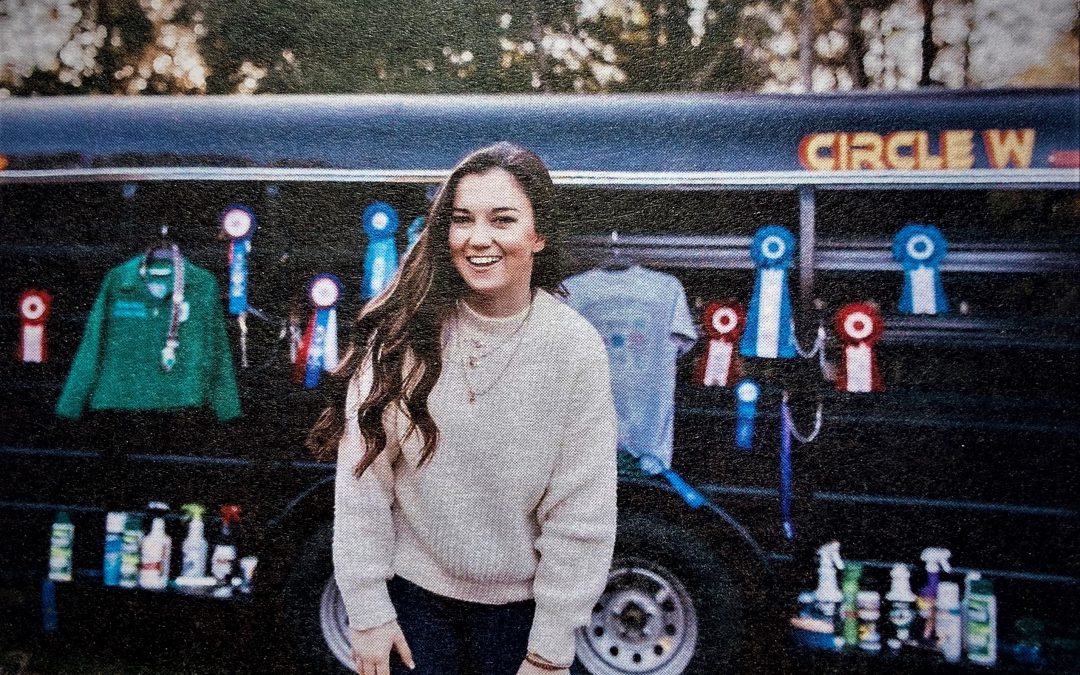
by Prudence Caskey | Jul 2, 2020
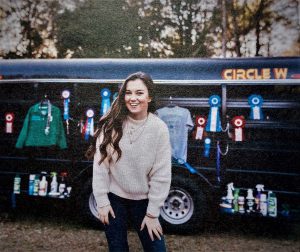
Madison standing in front of some of her award-winning efforts in 4-H
Madison Fendley joined Santa Rosa County 4-H in 2010 at the age of eight. In the beginning, her passion was showing rabbits and chickens. As she grew up, her interest in raising livestock grew as well. After raising show-quality dairy goats for many years, Madison had been in the show ring numerous times. With this experience, Madison shared her knowledge with youth that were new to showing livestock. She could always be seen in the show prep area, working with youth that were inexperienced and nervous. Madison became one of Santa Rosa County 4-H’s best mentors for youth, new to the showing world.
Madison has learned a lot about hard work and dedication through her 4-H goat project. Thinking back, Madison stated, “I feel accomplished for growing my goat herd from just a few brush goats when I started over ten years ago to nearly a completely registered show quality herd now.” She said she always enjoyed helping grow the goat show at the Santa Rosa County Fair and helping teach other youth about showing goats.
“I’ve loved working with the younger kids in our club and watching everyone grow and branch out.”
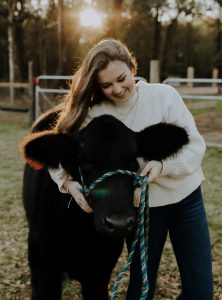
Madison and her livestock project
Madison has made a difference in the Santa Rosa County 4-H program. Many 4-H day camps had the opportunity to utilize Madison’s leadership skills as she served as a counselor. She has worked very hard while raising livestock and even received Reserve Champion Steer at the Santa Rosa County Fair. She has also received Grand Champion Homegrown Heifer two years in a row. Madison recalls, “4-H has been an excellent opportunity to learn leadership and step out of my comfort zone sometimes. I would say I’ve come a long way since I first joined from showing chickens and rabbits to goats and now cattle.” When asked about her biggest lesson she has learned from 4-H, Madison replied, “I’d say one of my biggest accomplishments in 4-H, that nearly brought me to tears, was placing 1st in Steer Showmanship at the fair because it was the first year I showed cattle and the first show I’d been in with that steer.”
Madison plans to attend the University of West Florida and complete her Associate in Arts degree. She will pursue a degree in an agricultural or animal science-related field. Madison, we thank you for your many years of service to Santa Rosa County 4-H and the Santa Rosa County Fair & Youth Livestock programs. We
To find out more information about 4-H programs that can offer essential life skills such as independence, organizational skills, and goal setting, to your children or to volunteer with 4-H, please contact your local UF/ IFAS County Extension Office.
*Please note Madison’s pictures were taken prior to our challenges with Covid-19 and we encourage people to social distance and wear a mask for the personal safety of self and others.*




